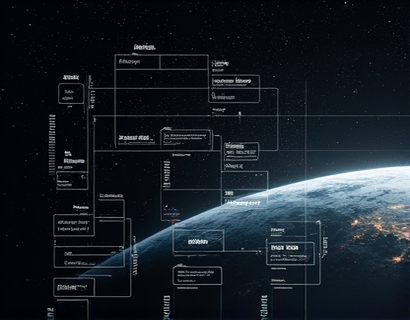Decentralized DAO Management: Transforming Governance with Advanced Analytics and Collaboration Tools
In the rapidly evolving landscape of decentralized finance and autonomous organizations, the role of governance has become increasingly complex and critical. Decentralized Autonomous Organizations (DAOs) represent a novel approach to governance, leveraging blockchain technology to create transparent, community-driven entities. However, managing a DAO effectively requires robust tools and strategies to handle the intricacies of decentralized decision-making. This article delves into how advanced software solutions can transform DAO governance by integrating advanced analytics and collaboration tools, thereby enhancing transparency, efficiency, and sustainability.
The Need for Advanced Governance Tools in DAOs
DAOs operate on a unique model where decisions are made collectively by token holders, often through on-chain voting mechanisms. While this approach promotes decentralization and community involvement, it also introduces significant challenges. Managing a DAO involves coordinating diverse stakeholders, ensuring compliance with protocols, and making data-driven decisions. Traditional governance methods are often inadequate for the scale and complexity of DAOs, necessitating advanced tools to streamline processes and provide deeper insights.
The primary challenges in DAO governance include ensuring transparency, facilitating effective communication, and enabling informed decision-making. Transparency is crucial for building trust among members, but the decentralized nature of DAOs can make it difficult to track actions and decisions. Effective communication channels are essential to keep all members informed and engaged, yet traditional methods can be slow and prone to miscommunication. Informed decision-making requires access to comprehensive data and analytics, which are often lacking in standard DAO management frameworks.
Advanced Analytics in DAO Governance
Advanced analytics play a pivotal role in transforming DAO governance by providing deep insights into various aspects of the organization. These tools leverage machine learning and data science to analyze large datasets, identify trends, and predict outcomes. For DAO administrators, this means having access to actionable intelligence that can inform strategic decisions and operational improvements.
One key area where analytics shine is in voter behavior analysis. By examining voting patterns, preferences, and engagement levels, administrators can better understand the dynamics within the community. This insight can help in designing more effective governance structures, tailoring communication strategies, and enhancing member participation. For instance, identifying inactive token holders can lead to targeted engagement campaigns to boost involvement and ensure a more representative decision-making process.
Financial analytics are equally important, especially in managing the DAO's treasury and resource allocation. Advanced analytics can track expenses, forecast financial trends, and optimize budgeting. This ensures that funds are used efficiently and transparently, reducing the risk of mismanagement and building trust among members. Additionally, predictive analytics can help anticipate potential financial challenges and proactively address them.
Collaboration Tools for Enhanced DAO Management
Effective collaboration is the backbone of successful DAO governance. Collaboration tools designed for decentralized environments facilitate seamless communication, document management, and project coordination. These tools are essential for breaking down silos and fostering a cohesive community effort.
One of the most significant benefits of advanced collaboration tools is their ability to centralize information and streamline workflows. Dashboards and project management platforms can provide a unified view of ongoing initiatives, tasks, and deadlines. This centralization ensures that all members are on the same page, reducing confusion and duplication of efforts. For example, a project management tool can track the progress of various proposals, from inception to implementation, ensuring that each step is transparent and accountable.
Communication tools are another critical component. Real-time messaging and discussion forums enable members to engage in timely and relevant conversations. These platforms can integrate with voting systems to facilitate smooth and efficient decision-making processes. For instance, a discussion thread can be linked directly to a voting proposal, allowing members to review relevant information before casting their votes. This integration not only enhances transparency but also ensures that decisions are based on well-informed discussions.
Enhancing Transparency Through Blockchain Integration
Transparency is a cornerstone of DAO governance, and blockchain technology provides a natural platform for achieving this. By leveraging blockchain, governance tools can ensure that all actions and decisions are immutable and verifiable. This level of transparency builds trust and accountability within the community.
Blockchain-integrated governance tools can track and record every transaction, proposal, and vote on the blockchain ledger. This creates an auditable trail that members can access at any time, ensuring that no action goes unnoticed. Smart contracts can automate many governance processes, such as executing votes and distributing funds, further reducing the potential for human error and manipulation. For instance, a smart contract can be programmed to release funds only after a proposal reaches the required threshold of support, ensuring that resources are allocated according to the community's will.
Moreover, blockchain-based tools can provide real-time updates on the status of proposals and financial transactions. Members can monitor the progress of initiatives and the utilization of funds in real time, fostering a culture of openness and trust. This transparency is crucial for maintaining member engagement and ensuring that the DAO operates in the best interest of its community.
Case Studies: Successful Implementation of Advanced Governance Tools
Several DAOs have successfully implemented advanced governance tools, demonstrating the tangible benefits of such integrations. One notable example is a decentralized content platform that used analytics and collaboration tools to enhance its governance structure.
By implementing advanced analytics, the platform gained insights into user behavior and content performance. This data helped in refining content strategies and improving user engagement. The platform also adopted a comprehensive collaboration toolset, including project management and communication platforms. These tools enabled the community to work together more effectively, streamlining the content creation and moderation processes. The result was a more cohesive and productive community, with members feeling more connected and empowered.
Another example is a decentralized finance (DeFi) DAO that integrated blockchain-based governance tools to manage its treasury and proposal process. The use of smart contracts ensured that fund distributions were automatic and transparent, reducing the risk of mismanagement. The platform also introduced a real-time voting system integrated with discussion forums, allowing members to review proposals and cast votes based on well-informed discussions. This approach not only increased voter participation but also led to more thoughtful and consensus-driven decisions.
Challenges and Considerations
While the benefits of advanced governance tools are clear, there are several challenges and considerations that DAOs must address to implement these solutions effectively. One of the primary challenges is the technical complexity involved in integrating and using these tools. Not all members may have the necessary technical expertise, which can create barriers to adoption. To mitigate this, DAOs should invest in user-friendly interfaces and provide comprehensive training and support.
Another consideration is the issue of scalability. As the DAO grows, the governance tools must be able to handle increased traffic and data volumes without compromising performance. Solutions should be designed with scalability in mind, leveraging cloud infrastructure and optimized algorithms to ensure smooth operation.
Privacy and security are also critical concerns. While transparency is essential, members must also have control over their personal data. Governance tools should incorporate robust privacy features and comply with relevant regulations to protect member information. Additionally, security measures must be in place to prevent unauthorized access and ensure the integrity of the governance process.
Future Trends in DAO Governance Tools
The landscape of DAO governance tools is rapidly evolving, with several emerging trends poised to further transform the field. One such trend is the integration of artificial intelligence (AI) to enhance decision-making processes. AI can analyze vast amounts of data to provide predictive insights and recommendations, helping administrators make more informed and strategic decisions. For example, AI-driven analytics can identify potential risks and opportunities, suggesting proactive measures to optimize the DAO's performance.
Another trend is the development of interoperable governance platforms that can seamlessly integrate with different blockchain ecosystems. As the decentralized space grows, the need for cross-platform compatibility becomes increasingly important. Interoperable tools can facilitate collaboration between diverse DAOs, enabling a more connected and cohesive decentralized community.
Lastly, the rise of user-centric design principles is shaping the future of governance tools. By focusing on the needs and preferences of DAO members, tools can be made more intuitive and accessible. This user-centric approach ensures that governance solutions are not only powerful but also user-friendly, encouraging broader adoption and engagement.
Conclusion
Advanced governance tools equipped with advanced analytics and collaboration features are revolutionizing the way DAOs are managed. These tools enhance transparency, efficiency, and sustainability, empowering administrators to make data-driven decisions and fostering a more engaged and cohesive community. As the decentralized ecosystem continues to grow, the importance of robust governance solutions will only increase. By embracing these innovative tools, DAOs can unlock their full potential and thrive in the dynamic world of blockchain technology.










































